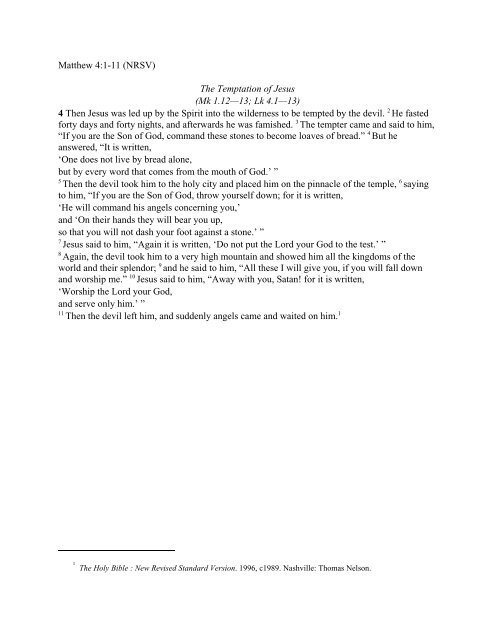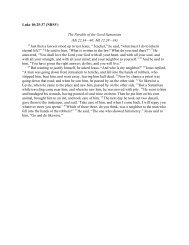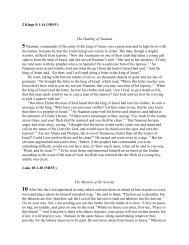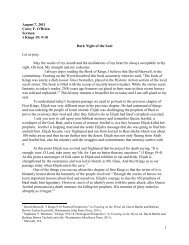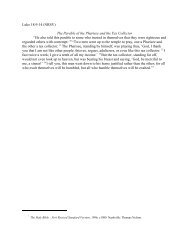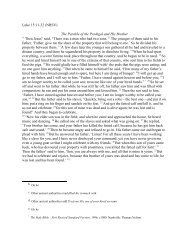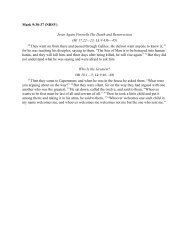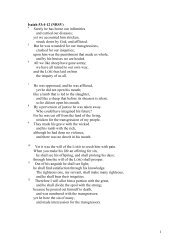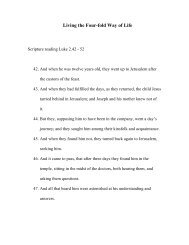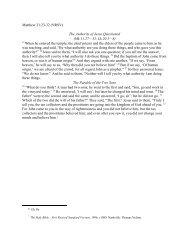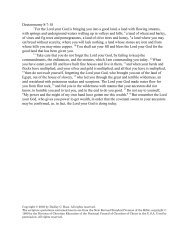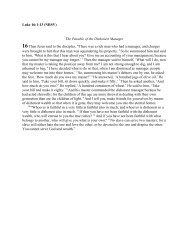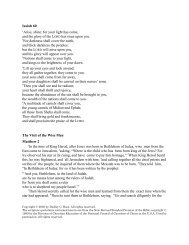Matthew 4:1-11 (NRSV) The Temptation of Jesus (Mk 1.12â13; Lk ...
Matthew 4:1-11 (NRSV) The Temptation of Jesus (Mk 1.12â13; Lk ...
Matthew 4:1-11 (NRSV) The Temptation of Jesus (Mk 1.12â13; Lk ...
Create successful ePaper yourself
Turn your PDF publications into a flip-book with our unique Google optimized e-Paper software.
<strong>Matthew</strong> 4:1-<strong>11</strong> (<strong>NRSV</strong>)<strong>The</strong> <strong>Temptation</strong> <strong>of</strong> <strong>Jesus</strong>(<strong>Mk</strong> 1.12—13; <strong>Lk</strong> 4.1—13)4 <strong>The</strong>n <strong>Jesus</strong> was led up by the Spirit into the wilderness to be tempted by the devil. 2 He fastedforty days and forty nights, and afterwards he was famished. 3 <strong>The</strong> tempter came and said to him,“If you are the Son <strong>of</strong> God, command these stones to become loaves <strong>of</strong> bread.” 4 But heanswered, “It is written,‘One does not live by bread alone,but by every word that comes from the mouth <strong>of</strong> God.’ ”5<strong>The</strong>n the devil took him to the holy city and placed him on the pinnacle <strong>of</strong> the temple, 6 sayingto him, “If you are the Son <strong>of</strong> God, throw yourself down; for it is written,‘He will command his angels concerning you,’and ‘On their hands they will bear you up,so that you will not dash your foot against a stone.’ ”7<strong>Jesus</strong> said to him, “Again it is written, ‘Do not put the Lord your God to the test.’ ”8Again, the devil took him to a very high mountain and showed him all the kingdoms <strong>of</strong> theworld and their splendor; 9 and he said to him, “All these I will give you, if you will fall downand worship me.” 10 <strong>Jesus</strong> said to him, “Away with you, Satan! for it is written,‘Worship the Lord your God,and serve only him.’ ”<strong>11</strong><strong>The</strong>n the devil left him, and suddenly angels came and waited on him. <strong>11</strong><strong>The</strong> Holy Bible : New Revised Standard Version. 1996, c1989. Nashville: Thomas Nelson.
and he says to him, “All these I will give you, if you will fall down and worship me.” This couldbe the knockout. But <strong>Jesus</strong> calmly absorbs the thunderous punch and strikes back with a righthook <strong>of</strong> his own, “Away with you, Satan! for it is written,‘Worship the Lord your God,and serve only him.’ Deuteronomy 6:13, and also 10:20.”<strong>The</strong> crowd cheered. <strong>The</strong> devil slunk away in defeat. And the angels came and tended thevictorious fighter, <strong>Jesus</strong> the Christ, heavyweight champion <strong>of</strong> heaven and hell. Whoa! What afight! What a contest! That pro<strong>of</strong>-texting stuff can get pretty rough!It’s a great story. And, it’s got the ending we would hope for. <strong>Jesus</strong> claims his victoryover Satan. He has a parade through Boston on a duck boat. Bill Belichick hires him as his newdefensive coordinator.But this story raises at least two interesting complexities. First, the devil can quotescripture. That means that scripture isn’t quite as simple and transparent as it might seem, or aswe might like it. We have right in scripture itself a case where the devil quotes scripture, and thewhole point <strong>of</strong> the story is that the devil is wrong. One thing we cannot help but take away fromthis story is that quoting scripture is no guarantee <strong>of</strong> speaking the truth. In the story that isn’t toosignificant, because we know the characters. We know that <strong>Jesus</strong> is supposed to be right andthat the devil is supposed to be wrong. But what about here and now. When pro<strong>of</strong>-textingbattles occur today, how are we to decide who is right and who is wrong? How are we to decidewho is <strong>Jesus</strong> and who is the devil? For Christians today these are important questions becausewe believe that the scripture has some form <strong>of</strong> authority, even though we may not all agree aboutthe details <strong>of</strong> that authority. And the questions are important because there are many importantdebates today in which the Bible is quoted by both sides. So, it’s important to know, if we can,how to understand the authority <strong>of</strong> the Bible and how to tell when a person quotes the Biblewhether that person is closer to <strong>Jesus</strong> or to the devil.<strong>The</strong> second interesting complexity is perhaps related to the first. If one were to take<strong>Jesus</strong>’ quotation <strong>of</strong> Deuteronomy about bread–One does not live by bread alone–as the last wordon his feelings about bread, one would judge that <strong>Jesus</strong> has a rather low opinion <strong>of</strong> it, or at leastthat it’s not all that important. That would prepare us poorly for the ways in which breadappears in the rest <strong>of</strong> the Gospel.Let’s stay with <strong>Matthew</strong>’s Gospel, since that’s the one from which we read thetemptation story this morning. In chapter 4 <strong>Jesus</strong> says that one does not live by bread alone andrefuses the devil’s challenge to change stones into bread.Yet, in <strong>Matthew</strong> 6:<strong>11</strong>, <strong>Jesus</strong> teaches his disciples the prayer we say together everySunday. He says we should pray, “Give us this day our daily bread.” In <strong>Matthew</strong> 7:9, in a versethat echoes this mornings story, <strong>Jesus</strong> says to his listeners, “Is there anyone among you who, ifyour child asks for bread, will give a stone?” In <strong>Matthew</strong> 14 and 15 we have the story <strong>of</strong> feedingthe five thousand. When the hour became late, and crowds became hungry, <strong>Jesus</strong> did not say tothem, “Tighten your belt, friends. No one lives by bread alone.” Nor did he send them away toget their own bread. In one <strong>of</strong> the most important stories in the Gospels <strong>Jesus</strong> demonstratesGod’s promise <strong>of</strong> abundance. He multiplies five loaves and a few fish in order to feed the crowd<strong>of</strong> 5,000. And then, finally, in 26:26, at the last supper, when he is giving his disciples finalinstructions, he leaves them with the symbol second in importance only to the cross. <strong>The</strong>passage says, “While they were eating, <strong>Jesus</strong> took a loaf <strong>of</strong> bread, and after blessing it he broke2
it, gave it to the disciples, and said, ‘Take, eat; this is my body.’”It would be hard to imagine <strong>Jesus</strong> leaving a catalog <strong>of</strong> more positive references to bread.Nonetheless, in this morning’s passage he spurns the devil when the devil challenges him to turnstones into bread.So, we are back square in the face <strong>of</strong> our questions. How are we to read the meaning andauthority <strong>of</strong> scripture? And, how are we to know whether it is <strong>Jesus</strong> or the devil we are listeningto when someone quotes scripture to us?I wish I had easy answers to these questions for you. But like so many things in life,there are no easy answers, or saying it another way, easy answers are bound to be wronganswers. Indeed, the seemingly inborn human desire for simple answers <strong>of</strong>ten plagues us. Frompolitics to relationships to religion too <strong>of</strong>ten we steer away from the complex and prefer thesimple, even if the simple ultimately serves us poorly. It’s interesting to note that thisperspective I have just voiced, that the questions have complicated answers, already begins toshape where those answers will go, or at least where they will not. <strong>The</strong> appeal <strong>of</strong> Biblicalfundamentalism is its intended stark simplicity. If the Bible is, every word, dictated by God andtrue in the fullest and most certain sense, then interpreting scripture would presumably be arather straightforward matter. But as we have seen throughout this sermon, one can find allkinds <strong>of</strong> quotes in the Bible, and so even fundamentalists find themselves in complicatedterritory as they explain away the apparent discrepancies.In any case, because I think reading the Bible is complicated, and because I thinkunderstanding whether someone is using the Bible more like the devil than like <strong>Jesus</strong> iscomplicated, it follows that I don’t think that passages quoted from Bible in every case reliablyand obviously declare God’s will. I am grateful for this. Deuteronomy 21:21 declares that themen <strong>of</strong> the town should stone a rebellious son to death. Maybe others <strong>of</strong> you are as grateful as Iam that this law seems not be applied very much these days.On the other hand, I absolutely hold that within the Bible we may discern God’s trueword for us. By that I mean more than that I can find things in the Bible that I agree with. Too<strong>of</strong>ten, among all persuasions <strong>of</strong> Christians, that’s the standard by which the truth <strong>of</strong> a particularpassage is determined. Do I agree with it? If the Bible doesn’t challenge our beliefs at leastsome <strong>of</strong> the time, then we are not looking at the Bible, we are looking at a mirror. Most pro<strong>of</strong>textingthat I have seen falls into this category. <strong>The</strong> Bible is simply a mirror when I find apassage to justify what I already believe, and then quote it and then claim God’s authority for mybelief. I imagine God shivers whenever we engage in such distortions.<strong>The</strong> way I have come to think <strong>of</strong> discerning the Bible’s truth is first to believe that in it,taken as a whole, we can ascertain certain fundamental perspectives <strong>of</strong> God, which nointerpretation <strong>of</strong> the Bible ought to contradict. Here are some I think I have found. God loveshumankind, even if we wear God’s patience thin. God wishes us to love our neighbor as we loveourselves. God wishes us to do the things that build up creation, communities, and relationships,not the things that tear them down. God is in favor liberation from inequality, oppression, andother things that injure each other and alienate us from God’s hopes for us. God is <strong>of</strong>ten critical<strong>of</strong> the ways <strong>of</strong> societies and cultures. God prefers forgiveness to retribution. <strong>The</strong>se are a few tostart with. Discovering these fundamentals is a matter <strong>of</strong> reading the whole <strong>of</strong> the Bible andtrying to sense some <strong>of</strong> its most basic trajectories, values and truths. <strong>The</strong>y provide a startingpoint. <strong>The</strong>se truths are more provisional than absolute in the sense that reading the Bible may3
convince us that one or the other needs some adjustment. On the other hand, I believe that theones I have mentioned would find remarkable consensus.Now there is one more significant hurdle. Without getting into too much detail, or boringyou to death, interpreting individual passages from the Bible is complicated by a variety <strong>of</strong>factors. We may be guessing at the meaning <strong>of</strong> some <strong>of</strong> the ancient customs that are in thestories. We have to translate from other languages, and translation always involves choices, andwhat the translator chooses is a matter <strong>of</strong> interpretation. <strong>The</strong> meaning the text had in its time isnot always so readily transported into our time. For example, how many Christians findcircumcision to be an important religious issue? Not many, I suppose, but for Paul and hischurches it was <strong>of</strong> huge importance. So, even when we have some fundamental perspectives inhand, each passage <strong>of</strong> the Bible continues to present complications. I suppose all <strong>of</strong> this is to saythat the Bible requires careful and disciplined study.In any case let’s take a look at our championship pro<strong>of</strong>-texting bout between <strong>Jesus</strong> andthe devil and see if careful interpretation and the use <strong>of</strong> our basic principles help us understandwhat’s going on.<strong>The</strong> temptation passage occurs right after <strong>Jesus</strong>’ baptism, before he begins his ministry.We can expect it to illuminate some <strong>of</strong> his basic themes, then. If we look at it as a whole, itwould appear that the devil is <strong>of</strong>fering <strong>Jesus</strong> the power and wealth <strong>of</strong> the world. <strong>Temptation</strong> isprobably a bad translation <strong>of</strong> what’s going on here. A better one is testing; the devil is testing<strong>Jesus</strong>. But in a sense, it’s even more basic than that. <strong>The</strong> devil may well have been <strong>of</strong>fering<strong>Jesus</strong> the things he assumes anyone would want–snapping your fingers when you are hungry andbread appears from the stones, the avoidance <strong>of</strong> earthly death, and power and wealth. But <strong>Jesus</strong>claims the basic ground <strong>of</strong> his ministry. Ingesting only the bread you eat and forgetting aboutthe nourishing word that comes from God will leave you starving. Requiring God to proveimmortality in a physical way turns a matter <strong>of</strong> faith into a science experiment, and disregardsthe greater promises <strong>of</strong> God. And the pursuit <strong>of</strong> power and wealth <strong>of</strong> the world, rather than thepower and wealth <strong>of</strong> God, will leave you at the end <strong>of</strong> the day poor, indeed. <strong>The</strong>se representthemes <strong>of</strong> <strong>Jesus</strong>’ ministry. He is putting us on notice that he will come back to them time andagain.When we look at the title bout between the devil and <strong>Jesus</strong> in these terms, we realize that<strong>Jesus</strong> is not denigrating bread, but is simply saying that physical bread without spiritual breadwill not satisfy real hunger. <strong>Jesus</strong> is quoting scripture in service <strong>of</strong> and consistently with thebasic perspectives he finds in scripture. <strong>The</strong> most convincing answer, then, to how one tells ifthe person quoting scripture is more like <strong>Jesus</strong> or more like the devil, the most convincinganswer is found in how consistent or inconsistent the pro<strong>of</strong>-texter is with the basic teachings <strong>of</strong><strong>Jesus</strong> and the Bible.In our passage this morning the devil was the devil because he represented the values thatmuch <strong>of</strong> the world espouses, values that <strong>Jesus</strong> threw a knockout punch against. In short, if youhear someone representing worldly gain and power as the word <strong>of</strong> God, you can bet it’s the devilwho is quoting you scripture. As the Gospel says elsewhere, “Let those who have ears hear.”Amen.Copyright © 2005 by Dudley C. Rose. All rights reserved.4


